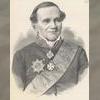National Archives of Karelia : Archival Mosaic of Karelian Culture | |||||
Glinka Fedor Nikolayevich (1786-1889) | |||||
|
Glinka Fedor Nikolayevich (1786-1880)Glinka Fedor Nikolayevich (1786-1889), a russian poet, publicist, writer and historian, participant of military operations in 1805-1806, Patriotic War in 1812 and foriegn campaigns against Napoleon in 1813-1814. Author of the patriotic book “Letters of a Russian Officer”, editor of “Voyenny Zhurnal” (1817-1819), one of the founders and leaders of “Free Society of the Amateurs of Russian Literature”, member of the literary-political society “The Green Lamp”, F.N. Glinka played an important role in the history of the early Decembrist organizations being an active member of the “Salvation Union” and one of the leaders of the “Prosperity Union”. Having moderate political views F.Glinka early gave up his political activities; he was not present at Senatskaya Square but nevertheless after supression of the Decembrist uprising he was discharged from the service and exiled to Petrozavodsk where he arrived escorted by the State messenger on the 30th of July, 1826. While staying in Petrozavodsk Glinka created one of his best poetic works – the poem “Karelia or Seclusion of Marpha Ivanovna Romanova” presently known to the readers under the title “Karelia”. Published in 1830 it evoked a warm response among readers. On the occasion of its edition “Literaturnaya Gazeta” noted that “the description of that place depicted in its wild beauty” was especially interesting and “remarks on morals, customs, beliefs of Karelians …. were also of great interest”. The following lines have a perfect sounding and touch the heart of everyone living in Karelia: “So wild is Karelia! A brilliant star is sparkling in the clouds above Kivach as the joy is sparkling sometimes in my mournful soul…. The villages are small and scattered. But the language of this woodland is so sweet”. The author sent one copy of the poem “Karelia” with a covering letter to A.S. Pushkin. A copy of this letter is being kept in the National Archives of the Karelian Republic. There is also a rare portrait of F.N. Glinka there. In 1827 in Petrozavodsk F.Glinka got acquainted with a scientist and philologist A.Shegren who in 1825, long before well-known E.Lennrot made the first records of the northern runes and acquainted F.Glinka with their contents. In the poem “The Maiden of Karelian Woods” F.Glinka made his first attempt to translate the northern runes into Russian defining them as sonorous and pleasantly sounding. Later on, Glinka continued to study and translate the Karelian epic literature. In a picturesque manner F.Glinka wrote to his friend N.Gnedich, a poet and a translator of “Iliad”, about his stay in Petrozavodsk: “Here, in Petrozavodsk which is considered to be a town (even a principal town of a province) I keep on (I would not say living) but a wearisome existence losing strength and years. My title here is the one of the Chief Councillor of the Olonets Province Administration”. Some recently found documents inform us about his work in this position. There is a register of the Olonets Province Administration dated 6, July, 1827 that contains the record of consideration of 16 issues about the activities of the uyezd courts. Each of these issues was considered and signed by the Olonets Govenor T.E.Fan-der-Flit and the Councillor F.Glinka. In 1828 F.Glinka together with the Govenor P.A.Lachinov took part in surveying the Olonets Province; they studied the work of uyezd towns’ administration. Upon the results of this survey the Olonets Govenor took measures aimed at the improvement of work of the institutions within his jurisdiction; in particular, all questions in respect of organization and execution of legal proceedings were solved by F.N.Glinka. A letter written by F.N.Glinka to the Board of Guardians of the School for the clerks’ children about donating books necessary for this educational institution on account of its opening for “ the initial foundation of the library” and for some other important, in his view, subjects is being kept in the National Archives of the Karelian Republic. In the beginning of 1829 F.N.Glinka appealed to the Head of the 3d Department* - count Benkendorf - asking to transfer him to another province. In his petition he alleged rigorous climate, illness and exteremely high cost of living in Petrozavodsk. So, he was given an imperial permission to transfer to Tver - secret supervision being kept. In spring 1830 the poet left Petrozavodsk having received the highest appraisal of the Olonets Govenor: “ …he worked with zeal, showed diligence in executing the work assigned and behaved perfectly in every respect”. * Russian Secret Service like FBI |
||||
| |||||
National Archives of Karelia : Archival Mosaic of Karelian Culture | |||||



